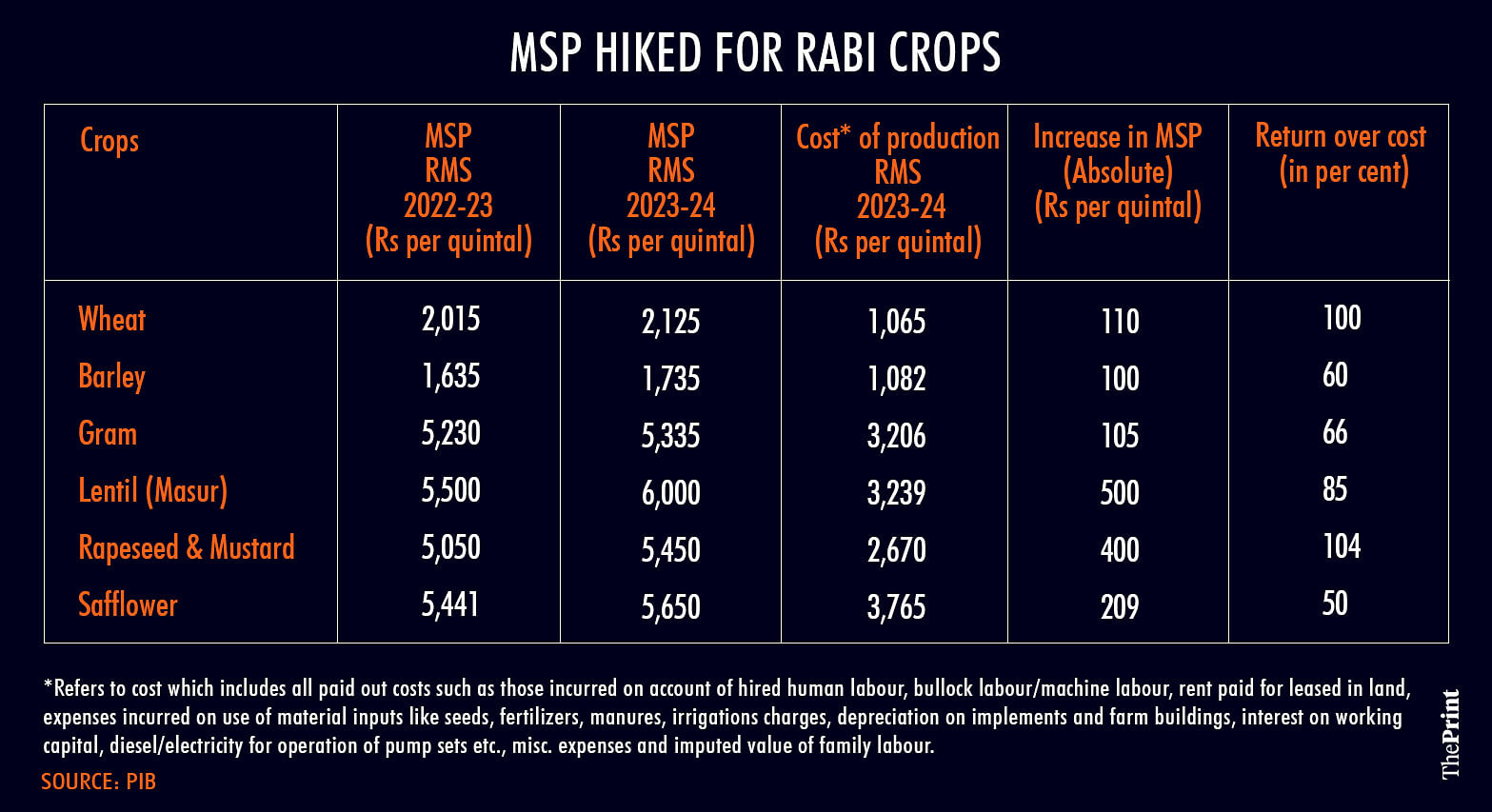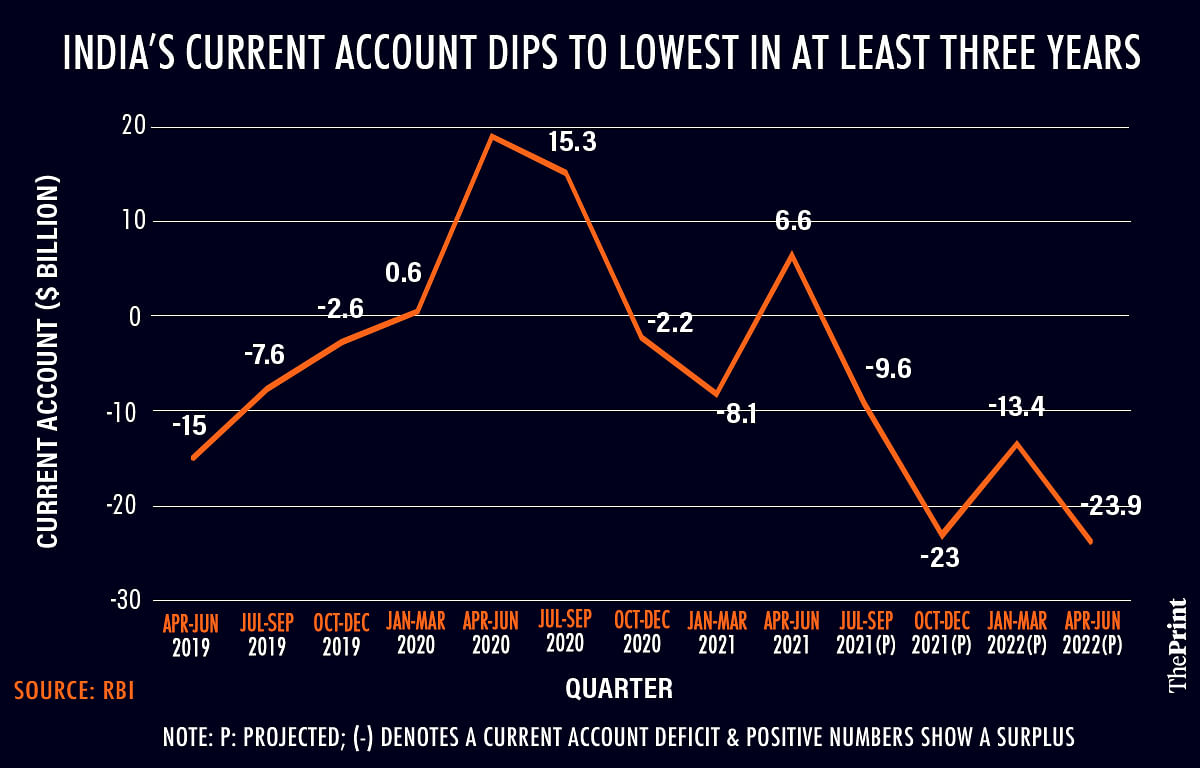New Delhi: The Union Cabinet’s decision Tuesday to increase the Minimum Support Price (MSP) for a range of Rabi crops is likely aimed at slowing the rapid growth in India’s Current Account Deficit (CAD) by incentivising domestic producers, according to economists.
The Cabinet Committee on Economic Affairs approved the increase in MSP for all mandated Rabi crops for the marketing season 2023-24. The highest increase, of Rs 500 per quintal, was provided for lentils (Masur), followed by a Rs 400 per quintal increase for rapeseed and mustard. The MSP for safflower was increased by Rs 209 per quintal, and for wheat, barley, and gram by Rs 110, Rs 100, and Rs 105 per quintal, respectively.

The decision to hike the MSP, especially for lentils and oilseeds such as rapeseed and mustard, is an attempt by the government to encourage domestic production so that India’s import dependence for these two crops reduces.
“For pulses and edible oils, we have a large dependence on imports,” D K Pant, chief economist at Mumbai-based credit rating agency India Ratings, told ThePrint.
“Look at the situation the country is facing with elevated global prices, so your CAD is ballooning and that is having an impact on your currency. So it’s a double whammy of higher commodity prices and a weakening currency,” he said.
“Now, if by increasing the MSP you can increase the domestic production, then you may have a favourable impact whereby your import dependence will come down,” Pant added.
India’s CAD — the quantum by which imports exceed exports — grew to $23.9 billion in the April-June 2022 quarter, the latest data available. It is the highest in at least three years. Some estimates project the CAD to grow even further to $40 billion in the July-September 2022 quarter.

Also Read: Govt may raise palm oil import taxes to help farmers reeling from lower oilseed prices
Incentive to increase production
Another reason the government could have gone ahead with such a significant increase in MSPs is to ensure that domestic production either remains the same or increases in the face of an anticipated global shortfall, D K Srivastava, India chief policy advisor at consultancy firm Ernst & Young, told ThePrint.
“The overall world economy is characterised by an anticipated shortage of various food items, and to avoid any impact of this on the Indian economy, the government is inclined to make sure that farmers are adequately incentivised to maintain or increase production in the selected crops,” he explained.
Srivastava further said that the government also wants to procure for its own reserves, adding that the MSP serves the purpose of not only providing a minimum income to the farmers, but also helps the government procure these crops.
According to the MSP hike press release, the government is looking at providing farmers remunerative rates in relation to the cost of production.
“The increase in MSP for Rabi Crops for Marketing Season 2023-24 is in line with the Union Budget 2018-19 announcement of fixing the MSP at a level of at least 1.5 times of the All-India weighted average cost of production, aiming at reasonably fair remuneration for the farmers,” it read.
It added that the maximum rate of return is 104 per cent for rapeseed and mustard, followed by 100 per cent for wheat, 85 per cent for lentils, 66 per cent for gram, 60 per cent for barley, and 50 per cent for safflower.
Also Read: India’s Amul milk model has a lot to teach its state cereals, pulses procurement schemes
‘BJP’s promise’
In his 2018-19 budget speech, then Finance Minister Arun Jaitley had said that the government had upheld the BJP’s manifesto promise of providing farmers a price that was 1.5 times their cost of production.
“In our party’s manifesto it has been stated that the farmers should realise at least 50 per cent more than the cost of their produce, in other words, one and a half times of the cost of their production,” Jaitley had said.
He had further said that the government had been very sensitive to this resolution and declared MSP for the majority of Rabi crops at least at one and a half times the cost involved.
The Tuesday press release added that the government has been focusing on increasing the production of oilseeds and pulses, in particular. Government data shows that oilseeds production has increased from to “37.7 million tonnes in 2021-22” from “27.51 million tonnes in 2014-15”, a 37 per cent increase.
“The productivity of pulses and oilseeds have increased substantially since 2014-15,” the release said, adding, “In case of pulses, productivity has been increased from 728 kg/ha (2014-15) to 892 kg/ha (4th Advance estimates, 2021-22) i.e. a 22.53% increase. Similarly, in oilseed crops productivity has increased from 1,075 kg/ha (2014-15) to 1,292 kg/ha (4th Advance estimates, 2021-22).”
(Edited by Theres Sudeep)
Also Read: A glut, low prices & high costs — why Himachal’s apple farmers are a bitter lot as polls near



